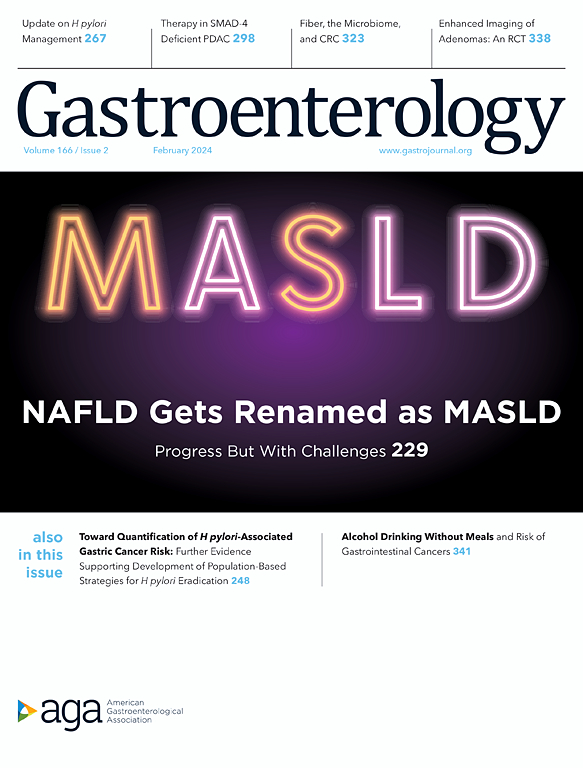AGA 中度至重度溃疡性结肠炎药物治疗生活临床实践指南
IF 25.7
1区 医学
Q1 GASTROENTEROLOGY & HEPATOLOGY
引用次数: 0
摘要
背景& 目的本美国胃肠病学协会(AGA)生活指南旨在支持从业人员对中重度溃疡性结肠炎(UC)进行药物治疗。方法由内容专家和指南方法论专家组成的多学科小组采用建议评估、开发和评价分级(GRADE)框架对临床问题进行优先排序,确定以患者为中心的结果,进行证据综合,并就中重度溃疡性结肠炎的药物治疗提出建议。对于中重度UC成人门诊患者,AGA建议使用英夫利西单抗、戈利木单抗、维多利珠单抗、托法替尼、乌达替尼、乌斯特库单抗、奥扎尼莫德、依曲莫德、利桑珠单抗和古谢库单抗等药物,并建议使用阿达木单抗、非格替尼和米利珠单抗,而不是不进行治疗。对于初次接受先进疗法的患者,AGA建议使用疗效较高的药物(如英夫利昔单抗、维多利珠单抗、奥扎尼莫德、依曲莫德、达帕替尼、利桑珠单抗和古谢库单)或中等疗效的药物(如戈利木单抗、乌斯特库单抗、托法替尼、菲戈替尼和米利库单抗),而不是疗效较低的药物(如阿达木单抗)。对于既往接受过一种或多种晚期治疗,尤其是肿瘤坏死因子(TNF)-α拮抗剂治疗的患者,AGA建议使用疗效较高的药物(如托法替尼、达帕替尼和乌司替尼)、ustekinumab)或中等疗效药物(如filgotinib、mirikizumab、risankizumab和guselkumab),而不是疗效较低的药物(如阿达木单抗、vedolizumab、ozanimod和etrasimod)。对于中重度 UC 成人门诊患者,AGA 建议不要使用硫嘌呤单药诱导缓解,但建议在维持(通常是皮质类固醇诱导的)缓解时使用硫嘌呤单药而不使用任何治疗。AGA 建议不要将甲氨蝶呤单一疗法用于诱导或维持缓解。对于中重度 UC 成人门诊患者,AGA 建议使用英夫利昔单抗、阿达木单抗和戈利木单抗联合免疫调节剂,而不是相应的单药治疗。不过,对于非 TNF 拮抗剂生物制剂与免疫调节剂合用而非非 TNF 生物制剂单独使用,AGA 没有提出赞成或反对的建议。对于接受TNF拮抗剂和免疫调节剂联合治疗至少6个月且无皮质类固醇临床缓解的UC患者,AGA建议不要停用TNF拮抗剂,但不建议支持或反对停用免疫调节剂。对于中重度UC成人门诊患者,如果5-氨基水杨酸类药物治疗失败,并升级到使用免疫调节剂或先进疗法,AGA建议停用5-氨基水杨酸类药物。最后,对于中重度 UC 成人门诊患者,AGA 建议尽早使用先进疗法和/或免疫调节剂疗法,而不是在 5- 氨基水杨酸盐治疗失败后逐步升级。专家组还提出了优化使用这些药物的关键实施注意事项,并指出了一些知识缺口和未来研究领域。结论本指南为中重度 UC 患者的药物治疗提供了一种全面的、以患者为中心的方法。本文章由计算机程序翻译,如有差异,请以英文原文为准。
AGA Living Clinical Practice Guideline on Pharmacological Management of Moderate-to-Severe Ulcerative Colitis
Background & Aims
This American Gastroenterological Association (AGA) living guideline is intended to support practitioners in the pharmacological management of moderate-to-severe ulcerative colitis (UC).Methods
A multidisciplinary panel of content experts and guideline methodologists used the Grading of Recommendations Assessment, Development and Evaluation (GRADE) framework to prioritize clinical questions, identify patient-centered outcomes, conduct an evidence synthesis, and develop recommendations on the pharmacological management of moderate-to-severe UC.Results
The AGA guideline panel made 14 recommendations. In adult outpatients with moderate-to-severe UC, the AGA recommends the use of infliximab, golimumab, vedolizumab, tofacitinib, upadacitinib, ustekinumab, ozanimod, etrasimod, risankizumab, and guselkumab, and suggests the use of adalimumab, filgotinib, and mirikizumab over no treatment. In patients who are naïve to advanced therapies, the AGA suggests using a higher-efficacy medication (eg, infliximab, vedolizumab, ozanimod, etrasimod, upadacitinib, risankizumab, and guselkumab) or an intermediate-efficacy medication (eg, golimumab, ustekinumab, tofacitinib, filgotinib, and mirikizumab) rather than a lower-efficacy medication (eg, adalimumab). In patients who have previously been exposed to 1 or more advanced therapies, particularly tumor necrosis factor (TNF)-α antagonists, the AGA suggests using a higher-efficacy medication (eg, tofacitinib, upadacitinib, and ustekinumab) or an intermediate-efficacy medication (eg, filgotinib, mirikizumab, risankizumab, and guselkumab) rather than a lower-efficacy medication (eg, adalimumab, vedolizumab, ozanimod, and etrasimod). In adult outpatients with moderate-to-severe UC, the AGA suggests against using thiopurine monotherapy for induction of remission, but suggests using thiopurine monotherapy over no treatment for maintenance of (typically corticosteroid-induced) remission. The AGA suggests against using methotrexate monotherapy, for induction or maintenance of remission. In adult outpatients with moderate-to-severe UC, the AGA suggests the use of infliximab, adalimumab, and golimumab in combination with an immunomodulator over corresponding monotherapy. However, the AGA makes no recommendation in favor of, or against, the use of non-TNF antagonist biologics in combination with an immunomodulator over non-TNF biologic alone. In patients with UC who are in corticosteroid-free clinical remission for at least 6 months on combination therapy of TNF antagonists and an immunomodulator, the AGA suggests against withdrawal of TNF antagonists, but makes no recommendation in favor of, or against, withdrawing immunomodulators. In adult outpatients with moderate-to-severe UC, who have failed 5-aminosalicylates, and have escalated to therapy with immunomodulators or advanced therapies, the AGA suggests stopping 5-aminosalicylates. Finally, in adult outpatients with moderate-severe UC, the AGA suggests early use of advanced therapies and/or immunomodulator therapy, rather than gradual step-up after failure of 5-aminosalicylates. The panel also proposed key implementation considerations for optimal use of these medications and identified several knowledge gaps and areas for future research.Conclusions
This guideline provides a comprehensive, patient-centered approach to the pharmacological management of patients with moderate-to-severe UC.求助全文
通过发布文献求助,成功后即可免费获取论文全文。
去求助
来源期刊

Gastroenterology
医学-胃肠肝病学
CiteScore
45.60
自引率
2.40%
发文量
4366
审稿时长
26 days
期刊介绍:
Gastroenterology is the most prominent journal in the field of gastrointestinal disease. It is the flagship journal of the American Gastroenterological Association and delivers authoritative coverage of clinical, translational, and basic studies of all aspects of the digestive system, including the liver and pancreas, as well as nutrition.
Some regular features of Gastroenterology include original research studies by leading authorities, comprehensive reviews and perspectives on important topics in adult and pediatric gastroenterology and hepatology. The journal also includes features such as editorials, correspondence, and commentaries, as well as special sections like "Mentoring, Education and Training Corner," "Diversity, Equity and Inclusion in GI," "Gastro Digest," "Gastro Curbside Consult," and "Gastro Grand Rounds."
Gastroenterology also provides digital media materials such as videos and "GI Rapid Reel" animations. It is abstracted and indexed in various databases including Scopus, Biological Abstracts, Current Contents, Embase, Nutrition Abstracts, Chemical Abstracts, Current Awareness in Biological Sciences, PubMed/Medline, and the Science Citation Index.
 求助内容:
求助内容: 应助结果提醒方式:
应助结果提醒方式:


